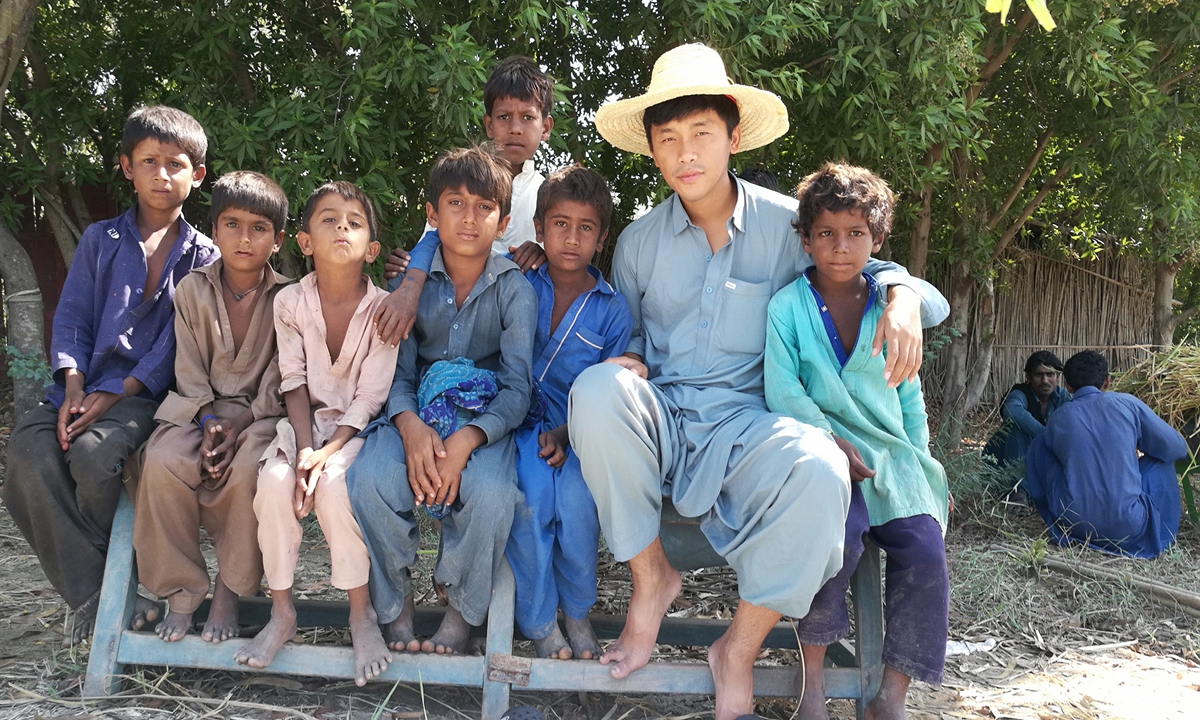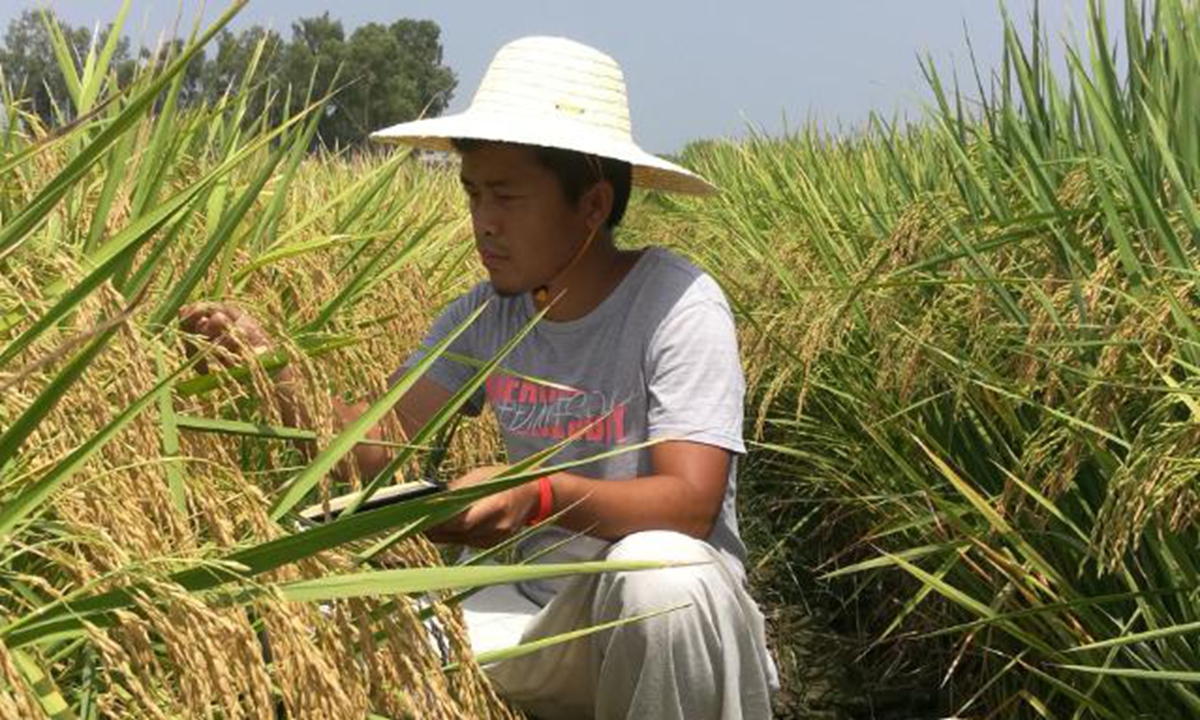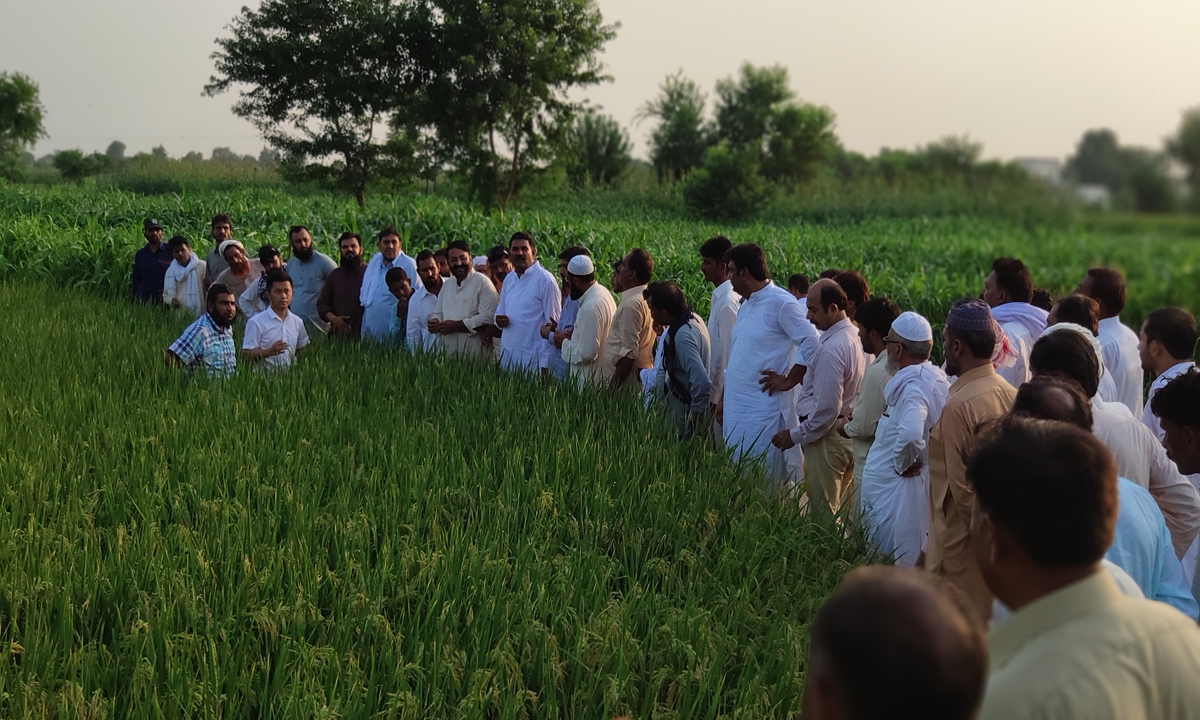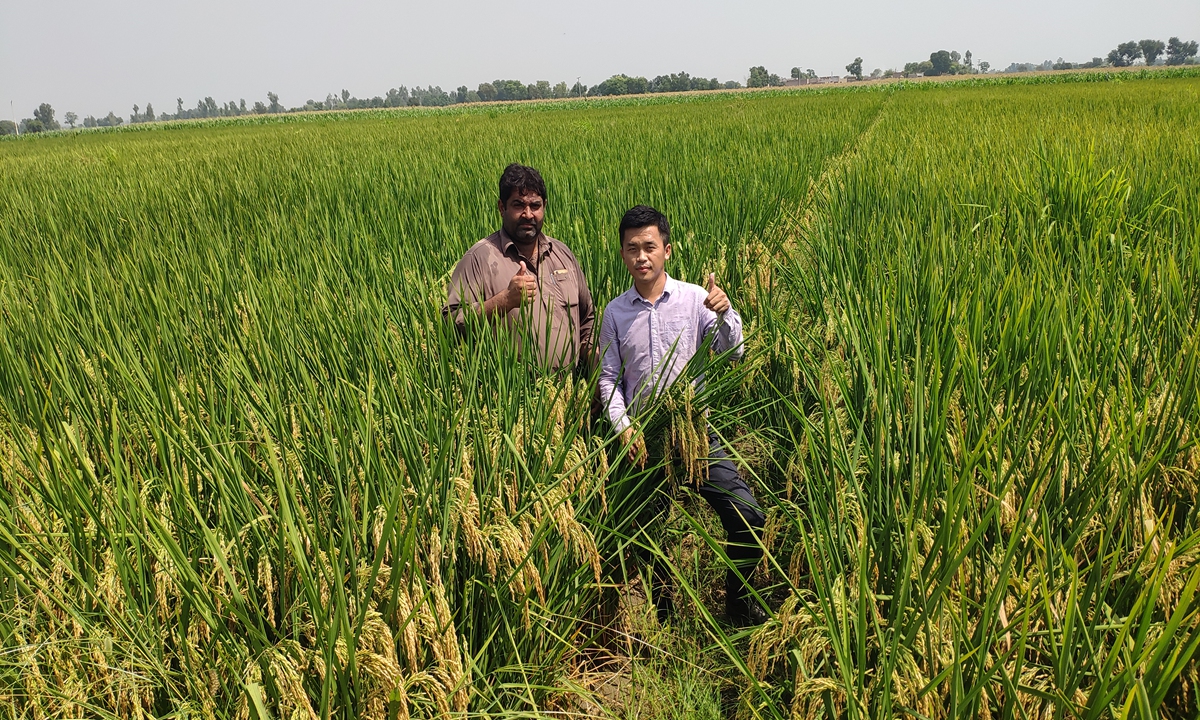Chinese agronomy expert dreams of return to Pakistan
By Li Lei Source:Global Times Published: 2020/6/4 20:02:01

Dai Yingnan (2nd from right) with local children sitting beside a paddy field. Photo: Courtesy of Dai Yingnan
Four months after Dai Yingnan returned to China from Pakistan, he became so eager to go back to the paddy fields in Pakistan. "I cannot live this way anymore as I've had no field to plough since I came back to China," he cried out loud in a short video posted on his Douyin account, China's hit short video platform.
The post-1990s young man spends six to seven months a year in Pakistan to promote hybrid rice. Due to the novel coronavirus outbreak, he has been "stranded" in China since the Spring Festival.
Dai uploaded some 500 short videos on his Douyin account and the most common scenes are paddy fields, muddy feet and beaming local farmers sitting by paddy fields.
Feeding the world
"My job is to promote hybrid rice seeds to Pakistani farmers, and provide them follow-up consultation and training services," Dai told the Global Times, adding that hybrid rice helps local farmers increase production 50 - 100 percent compared with traditional rice varieties.
After his graduation from Hunan Agriculture University in 2017, Dai was recruited to Yuan Longping High-tech Agriculture Co with Yuan Longping, China's "Father of Hybrid Rice" serving as its honorary chairperson, and was later dispatched to Pakistan.

Dai Yingnan observes hybrid rice in a paddy field in Pakistan. Photo: Courtesy of Dai Yingnan
After spending three years in Pakistan, Dai has travelled across the country, observing test fields, introducing hybrid rice seeds to local farmers, and training them. "We don't have weekends, and I could spend days on the road visiting farmers one by one in various counties," said Dai. He often ate one meal a day.
His efforts paid off as farmers embraced planted hybrid rice seeing a better harvest. "Four months ago, it was a whole bunch of dry land here, now it has become an oasis," Dai said in a short video.
After introducing rice seeds, Dai and his team members would rent land to act as an experimental field to collect data during the growth of hybrid rice under the local environment, and train local farmers on how to do it. "We would test hundreds and thousands of varieties of hybrid rice every year and promote those with better performance," he said.
Local farmers were also employed to manage experimental fields. However, due to different working cultures and language barriers, the experiment didn't go smoothly in the beginning. "Sometimes they forgot to irrigate or fertilize, and when we required them to count the exact number of grains in a rice spike, they would give us an approximate number instead," he said.
"For farmers, it is important to buy good seeds," Dai said.
In the beginning, most farmers hesitated to choose hybrid rice as its cost is 100 to 300 yuan ($14-43) higher than regular rice per mu. After getting to know the yield of hybrid rice, they literally swarmed to the field to see the crop that would bring them more money.
"After knowing the estimated yield of hybrid rice, they were so thrilled and started dancing in the field," Dai said on his social media.
When Pakistani farmers saw Dai's hybrid rice had such a high germination rate for the first time, they cried out, "Unbelievable! Chinese hybrid rice is really good, almost no dead seeds. We all love China's hybrid rice."
After winning trust from local villagers, Dai and his team started to train them on how to plant hybrid rice.
Dai told the Global Times that planting hybrid rice even changed Pakistani farmers' working manner and philosophy.
"Hybrid rice requires excessive attention to yield highly such as irrigating and fertilizing on time, while most Pakistani farmers believe that a harvest depends on God's will. So they sowed the seeds and prayed to God for a good harvest, which resulted in poor management and low yield," said Dai, adding that farmers didn't see any good harvest that year.
"So, farmers gradually realized that their corn yield increases as long as they put effort into it," said Dai. They would treat us with their best tea after the harvest.
After hybrid rice becomes popular in Pakistan, farmers in more countries will love it.

Local farmers swarm to the paddy field in Pakistan, yearning to know more about Chinese hybrid rice. Photo: Courtesy of Dai Yingnan
Indissoluble bond
Born in a village in Northeast China's Liaoning Province, Dai has built a tight bond with paddy fields as he would work in them with his parents since he was a child, which made him develop natural feelings towards farming life and empathy for the hardship of farmers.
"Since I was a child, my father told me to study hard and never do farm work again," he said. However, he chose to learn agronomy at Hunan Agriculture University as few students would compete for the major, which would allow him to attend the university.
The idea of becoming a farmer again after receiving an undergraduate degree bothered him shortly after entering the university. A conversation with Yuan Longping in an interview during his college studies dispersed his confusion. "The esteemed man told me that agriculture that sustains the life of the people is the foundation of a country, while it is also a slow-growing industry that requires time and devotion," said Dai. "He encouraged me to seek truth in the fields."
After the first novelty of life in a new country dissipated, and the hardship and boredom of life in rural Pakistan became prominent, he also felt lost and confused when he stood by the fields. "I will spend my most precious 20 years here, which means all the benefit, convenience, and life I could have enjoyed in China would be limited," Dai told the Global Times.

Dai Yingnan (R) poses for a group photo with a Pakistani farmer. Photo: Courtesy of Dai Yingnan
"Now that I have spent three years in Pakistan, I realized that I am really doing a great job which not only benefits myself, but also benefits the people of other countries," he said.
Dai never concealed his love and passion for the paddy fields and his job. "I have spent my most precious years in Pakistan, and sometimes I even forget my original aspiration of planting rice here," he wrote on his social media.
Dai is still single since he spends most of his time in a year abroad. His girlfriend broke up with him because he chose Pakistan over her. In the following years, he had several dates, and all of them fell through because he had to return to Pakistan.
"Now I am back in China but missing the happy days in Pakistan, getting up, eating a meal and going to the paddy fields," he said.
"If I were allowed to choose my path in life, I would choose the paddy fields once again," said Dai.
Newspaper headline: Life away from the field
Posted in: PROFILE